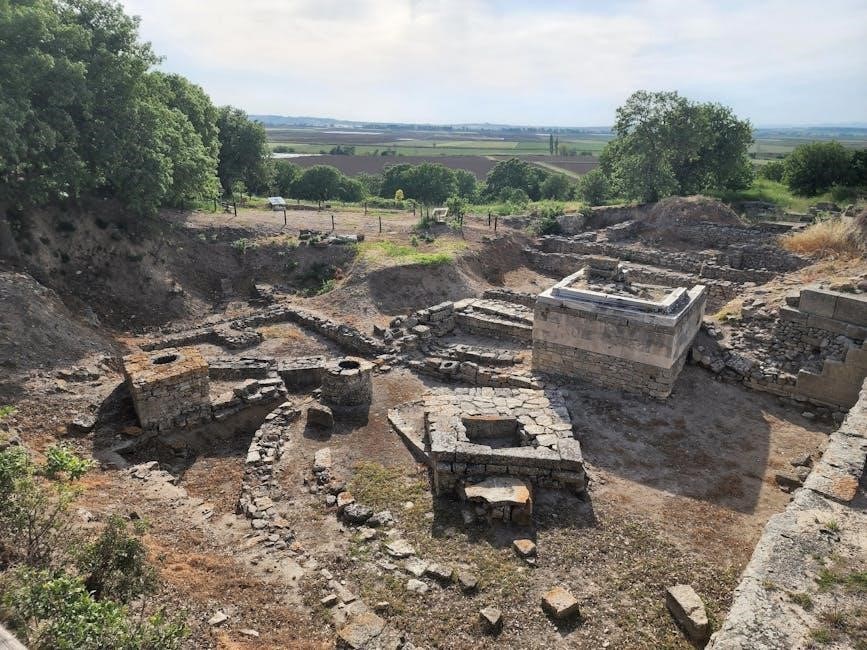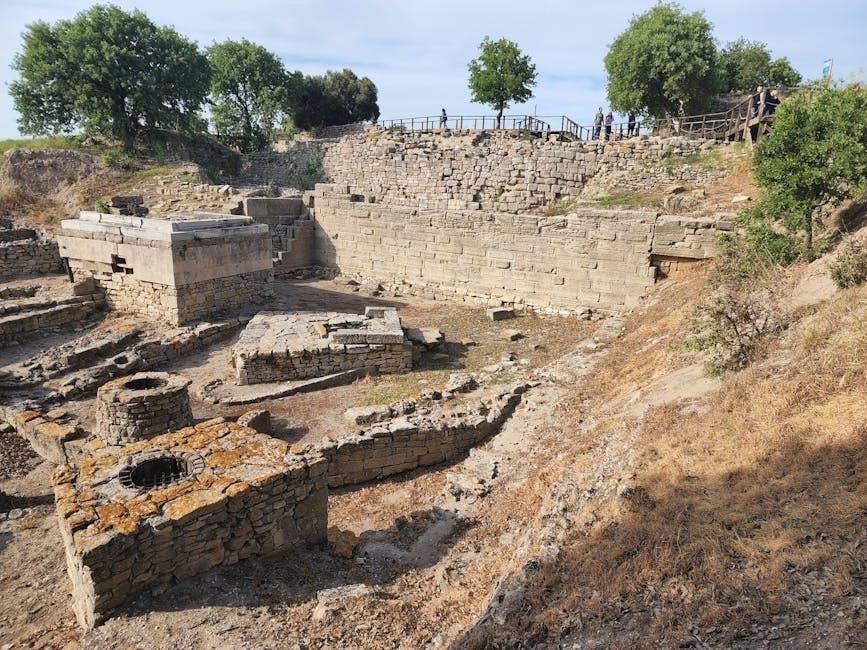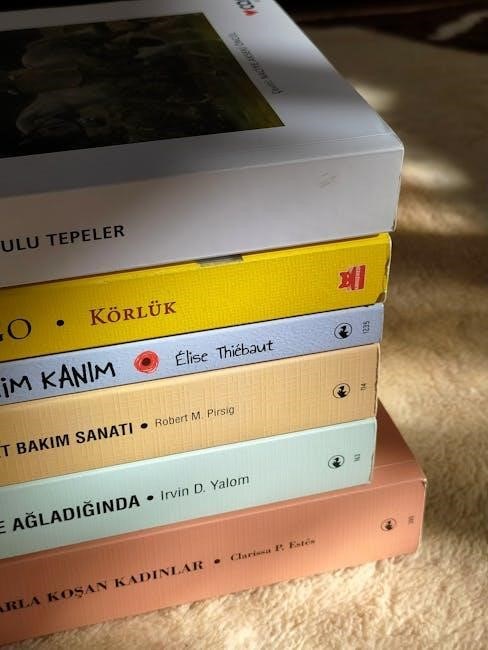Robert Fagles was a celebrated translator and Princeton University professor, renowned for his poetic renditions of classical epics like The Iliad, The Odyssey, and The Aeneid. His work bridges ancient literature and modern readership, ensuring timeless stories remain accessible and vivid.
1.1 Who is Robert Fagles?
Robert Fagles was a distinguished American professor and translator, best known for his acclaimed translations of classical epics. As Princeton University’s Arthur W. Marks ’19 Professor of Comparative Literature, Emeritus, he earned recognition for rendering ancient texts like The Iliad into modern, accessible language. His work bridges scholarship and artistry, making classical literature resonate with contemporary readers.
1.2 Fagles’ Contribution to Classical Literature
Robert Fagles’ translations of classical texts, particularly The Iliad, revitalized ancient works for modern audiences. His poetic yet faithful renderings have made Homer’s epic accessible, earning widespread acclaim. Fagles’ work not only preserves the original’s grandeur but also ensures its relevance, fostering a deeper appreciation for classical literature in contemporary times while maintaining academic integrity and artistic expression.
The Significance of “The Iliad”
The Iliad is a cornerstone of Western literature, exploring themes of heroism, honor, and the human cost of war. Its influence endures, with translations like Fagles’ ensuring its accessibility in formats such as PDF, making it a timeless classic for modern readers.
2.1 Overview of “The Iliad” as a Literary Masterpiece
The Iliad, an epic poem by Homer, is a literary masterpiece that explores the Trojan War, focusing on Achilles’ rage and his conflict with Hector. It delves into themes of heroism, honor, and the devastating human cost of war. As a cornerstone of Western literature, its influence spans millennia, with Robert Fagles’ poetic translation making it accessible in formats like PDF, ensuring its enduring relevance for modern readers.
2.2 The Story of Achilles and the Trojan War
Achilles, the legendary Greek warrior, is at the heart of The Iliad. His rage against King Agamemnon ignites the central conflict, driving the narrative of the Trojan War. The epic explores his battles, notably with Hector, and the devastating consequences of his wrath. The story intertwines human emotion, divine intervention, and the futility of war, creating a timeless tale of heroism and tragedy.

Fagles’ Translation of “The Iliad”
Robert Fagles’ translation of The Iliad is celebrated for its poetic language and fidelity to Homer’s original text. His modern English rendition captivates readers while preserving the epic’s grandeur and emotional depth, making it a benchmark for classical translations. The inclusion of Bernard Knox’s introduction enhances the reader’s understanding of the ancient masterpiece.
3.1 Unique Features of Fagles’ Translation
Robert Fagles’ translation of The Iliad stands out for its poetic yet accessible language, blending modern English with the epic’s original grandeur. His verses maintain the emotional intensity and complexity of Homer’s work while making it approachable to contemporary readers. This balance ensures the ancient epic remains relevant and engaging, bridging the gap between classical and modern literature effectively.
3.2 Poetic Language and Accessibility
Robert Fagles’ translation of The Iliad is distinguished by its poetic duality, blending grandeur with emotional depth. His language is both lyrical and accessible, capturing Homer’s essence while engaging modern readers. Fagles’ verses resonate with a timeless quality, making the epic’s complex themes and characters relatable. This balance of poetic beauty and clarity ensures the ancient text remains vivid and approachable for contemporary audiences.
3.3 Fidelity to the Original Greek Text
Robert Fagles’ translation of The Iliad remains faithful to the original Greek text while preserving its poetic essence. His commitment to accuracy ensures that Homer’s intent and emotional depth are maintained. Fagles’ work strikes a balance between linguistic precision and literary artistry, making the ancient epic both authentic and accessible to modern readers.

Availability of “The Iliad” in PDF Format
The Iliad in PDF format is widely available online through universities, free platforms like Gutenberg, and paid services, ensuring easy access for modern readers.
4.1 Sources for Downloading the PDF
The Iliad PDF, translated by Robert Fagles, can be downloaded from various sources, including universities, free platforms like Project Gutenberg and Internet Archive, and paid services such as Amazon and Google Books. Additionally, many academic institutions and digital libraries offer free or subscription-based access to this renowned translation, ensuring widespread availability for readers worldwide.
4.2 Free and Paid Platforms Offering the PDF
Free platforms like Project Gutenberg, Internet Archive, and university repositories offer The Iliad PDF translated by Robert Fagles. Paid platforms, including Amazon, Google Books, and eBook subscription services, also provide access. These options ensure that Fagles’ acclaimed translation, known for its poetic language and fidelity to the original, remains accessible to a wide audience, blending convenience with literary excellence.
4.3 University and Archive Sources
Universities such as Princeton and the New York Public Library, along with archives like Internet Archive, provide free access to The Iliad PDF. These sources often host high-quality, reliable copies of Fagles’ translation, making it easily accessible for academic and personal use. They ensure that this classical masterpiece remains within reach for scholars and enthusiasts alike, preserving its literary significance.
Reception and Reviews of Fagles’ Translation
Robert Fagles’ translation of The Iliad has received widespread critical acclaim for its poetic language and fidelity to the original text. Scholars and readers praise its accessibility, making ancient epic poetry resonate with modern audiences while maintaining its timeless grandeur and emotional depth.
5.1 Critical Acclaim and Scholarly Praise
Robert Fagles’ translation of The Iliad has garnered widespread critical acclaim for its masterful blend of poetic language and faithful interpretation of Homer’s original Greek text. Scholars praise its ability to capture the epic’s grandeur while remaining accessible to modern readers. Bernard Knox’s introductions further enhance the academic appreciation, solidifying Fagles’ work as a landmark in classical literature translation.
5.2 Reader Feedback and Popularity
Readers widely praise Robert Fagles’ The Iliad for its engaging and accessible language, which bridges ancient epic poetry with modern readability. Many appreciate how his translation preserves the emotional depth and poetic grandeur of Homer’s original work, making it a favorite among both casual readers and scholars. Its popularity endures as a go-to rendition for understanding and appreciating The Iliad.

Comparisons with Other Translations
Robert Fagles’ The Iliad is often compared to translations by Richmond Lattimore, Samuel Butler, and George Chapman, with Fagles praised for balancing poetic expression and readability.
6.1 Richmond Lattimore’s Translation
Richmond Lattimore’s translation of The Iliad is celebrated for its strict fidelity to Homer’s Greek text, maintaining the original structure and poetic meter. Unlike Fagles, Lattimore’s work is more literal, offering a scholarly precision that appeals to classicists. While Fagles emphasizes readability and emotional resonance, Lattimore’s version remains a benchmark for academic study, balancing accuracy with the grandeur of Homer’s verse.
6.2 Samuel Butler’s Translation
Samuel Butler’s 19th-century prose translation of The Iliad is noted for its clarity and accessibility, offering a straightforward interpretation of Homer’s epic. Unlike Fagles’ poetic verse, Butler’s version is more literal, appealing to readers seeking a direct understanding of the original narrative. While less lyrical than Fagles, Butler’s work remains a respected choice for its faithful rendering and ease of comprehension, especially for those new to classical literature.
6.3 George Chapman’s Translation
George Chapman’s 17th-century translation of The Iliad is celebrated for its poetic and archaic style, offering a rich, interpretive rendition of Homer’s text. Chapman’s verse captures the epic’s grandeur but differs from Fagles’ modern accessibility. His work, while less literal, remains a foundational translation, influencing later adaptations and maintaining its literary significance despite its challenging archaic language for contemporary readers.

The Role of Bernard Knox in Fagles’ Edition
Bernard Knox contributed insightful introductions and notes to Fagles’ translations, enhancing understanding of Homer’s context and themes. His scholarly expertise enriched the editions, making them invaluable for readers.
Bernard Knox’s introductions and notes in Fagles’ editions provide historical context, thematic insights, and literary analysis. His contributions illuminate Homer’s world, offering readers a deeper understanding of The Iliad’s cultural and historical significance, making the epic more accessible and engaging for modern audiences while maintaining academic rigor and clarity.
7.2 Knox’s Contribution to the Understanding of “The Iliad”
Bernard Knox’s introductions and notes in Fagles’ translation enhance the reader’s understanding of The Iliad’s themes and historical context. His scholarly insights provide a rich framework for interpreting Homer’s work, bridging the gap between ancient Greek culture and modern readers, ensuring the epic remains relevant and thought-provoking in contemporary times.

Robert Fagles’ Academic and Professional Background
Robert Fagles was the Arthur W. Marks ’19 Professor of Comparative Literature at Princeton University. He received the PEN/Ralph Manheim Medal and an Academy Award in Literature.
8.1 Fagles’ Position at Princeton University
Robert Fagles held the esteemed position of Arthur W. Marks ’19 Professor of Comparative Literature at Princeton University. His academic career was marked by a deep commitment to classical literature and translation. Fagles’ role at Princeton highlighted his scholarly contributions and teaching excellence, solidifying his reputation as a leading figure in the field of comparative literature.
8.2 Awards and Recognition for His Work
Robert Fagles received the 1997 PEN/Ralph Manheim Medal for Translation and a 1996 Academy Award in Literature from the American Academy of Arts and Letters. His translations of classical epics earned widespread acclaim, cementing his legacy as a master translator. Fagles was also elected to the American Academy of Arts and Sciences and the American Philosophical Society, recognizing his scholarly and literary contributions.
The Structure of “The Iliad”
The Iliad is divided into 24 books, chronicling the rage of Achilles and the climactic events of the Trojan War, structured to build dramatic tension and resolve.
9.1 Books 1-12: The Rage of Achilles
Books 1-12 of The Iliad focus on Achilles’ rage, sparked by his dishonor and the seizure of Briseis by Agamemnon. His withdrawal from battle leads to Greek setbacks, including the death of Patroclus, fueling Achilles’ vengeance. These books explore themes of honor, pride, and the devastating consequences of unchecked anger, setting the stage for the epic’s tragic unfolding.
9.2 Books 13-24: The Climax and Resolution
Books 13-24 of The Iliad detail the epic’s climax and resolution. Hector’s tragic duel with Achilles and King Priam’s poignant plea for his son’s body highlight the devastating cost of war. Fagles’ translation masterfully captures the emotional depth and intensity, culminating in a bittersweet resolution that underscores the enduring themes of human suffering and the futility of conflict.

Themes and Motifs in “The Iliad”
The Iliad explores themes of heroism, honor, and the human cost of war, while delving into fate, divine intervention, and the complexities of human emotion and mortality.
10.1 The Nature of Heroism and Honor
Robert Fagles’ translation of The Iliad vividly portrays heroism and honor as central themes, emphasizing Achilles’ rage and quest for glory. The epic explores the complexities of heroism, where honor is tied to pride and reputation, shaping the characters’ decisions and fate in the Trojan War, reflecting both individual and collective ideals of ancient Greek culture.
10;2 The Human Cost of War
Robert Fagles’ translation of The Iliad underscores the devastating human cost of war, highlighting the suffering, loss, and emotional toll on characters like Achilles and Hector. The epic vividly portrays the personal sacrifices, moral dilemmas, and existential anguish, offering a profound exploration of war’s impact on individuals, families, and communities, transcending mere conflict to reveal the depth of human emotion and vulnerability.
10.3 Divine Intervention and Fate
Robert Fagles’ translation of The Iliad vividly portrays divine intervention, with Olympian gods influencing mortal affairs, shaping the Trojan War’s outcome. Fate, or moira, intertwines with human choices, creating a complex interplay of free will and divine will. This exploration of destiny and divine power adds depth to the narrative, highlighting the inevitability of certain outcomes and the tragic heroism of mortals confronting their fates.
The Impact of Fagles’ Translation
Robert Fagles’ translation of The Iliad revitalized classical literature, making it accessible to modern readers while preserving its epic grandeur and emotional depth, inspiring new adaptations and interpretations widely.
11.1 Making Classical Literature Accessible
Robert Fagles’ translations, including The Iliad, have democratized classical literature by rendering ancient texts in modern, poetic language. His work bridges the gap between scholarly accuracy and reader accessibility, ensuring that Homer’s epic tales resonate with contemporary audiences while maintaining their original emotional and intellectual depth.
11.2 Influence on Modern Adaptations and Interpretations
Robert Fagles’ translations have inspired modern adaptations, such as theatrical productions like An Iliad, which reinterpret Homer’s epic for contemporary audiences. His work has also influenced scholarly and popular reinterpretations, making ancient themes resonate in new contexts while preserving their timeless relevance and emotional depth;

Other Works by Robert Fagles
Beyond The Iliad, Fagles translated The Odyssey and The Aeneid, showcasing his mastery of classical literature and further solidifying his legacy as a leading translator of ancient epics.
12.1 “The Odyssey” Translation
Robert Fagles’ translation of The Odyssey (1996) is a landmark work, celebrated for its lyrical prose and fidelity to Homer’s original spirit. Like his Iliad, it captures the epic’s grandeur while making it accessible to modern readers. Fagles’ poetic language and nuanced interpretation of Odysseus’ journey have earned widespread acclaim, further cementing his reputation as a master translator of classical literature.
12.2 “The Aeneid” Translation
Robert Fagles’ translation of The Aeneid (2006) is a masterful rendition of Virgil’s epic, capturing the poem’s grandeur and emotional depth. Fagles’ poetic language and sensitivity to the original Latin text ensure a compelling narrative, making the ancient tale of Aeneas’ journey resonate with modern readers. This work, alongside his Iliad and Odyssey, solidified his legacy as a premier translator of classical epics.

The PDF Format and Modern Readers
The PDF format offers modern readers convenient access to classical texts like The Iliad, enabling easy digital reading while preserving the original’s integrity and scholarly annotations.
13.1 Benefits of Digital Access
Digital access to The Iliad in PDF format provides unparalleled convenience, allowing readers to engage with Fagles’ masterful translation anytime, anywhere. The format ensures portability across devices, enabling seamless reading experiences. Additionally, digital versions often include search functionality, making it easier for scholars and casual readers to navigate and reference specific passages. This accessibility bridges the gap between ancient literature and modern technology, fostering a wider audience for classical works.
13.2 Challenges of Reading Ancient Texts in Modern Formats
Reading ancient texts like The Iliad in modern PDF formats presents challenges, such as formatting issues that may disrupt the poetic flow. The static nature of PDFs can limit interactivity, and the lack of adjustable fonts or night modes may hinder readability on smaller screens. Additionally, the digital medium sometimes fails to preserve the original textual nuances, potentially affecting the reader’s immersive experience.

The Legacy of Robert Fagles
Robert Fagles’ enduring influence lies in his masterful translations, which have revitalized classical literature for modern audiences, earning him prestigious awards and a lasting impact on scholarly and popular readership.
14.1 His Influence on Classical Scholarship
Robert Fagles’ translations have profoundly impacted classical scholarship, offering fresh perspectives on ancient texts. His work, particularly The Iliad, is praised for its fidelity to the original Greek while maintaining poetic vibrancy, making complex works accessible to both academics and general readers, thereby enriching the field of classical studies and ensuring its relevance in contemporary discourse.
14.2 His Role in Popularizing Ancient Literature
Robert Fagles played a pivotal role in popularizing ancient literature through his accessible translations. His rendition of The Iliad brought Homer’s epic to a broader audience, merging scholarly accuracy with poetic flair. This approach democratized classical works, making them engaging for modern readers and revitalizing interest in ancient texts, ensuring their enduring relevance in contemporary culture and education.
Robert Fagles’ translation of The Iliad remains a landmark achievement, blending fidelity to the original with modern accessibility. His work ensures Homer’s epic endures as a timeless literary treasure, resonating across generations and cultures.
15.1 Summary of Fagles’ Contribution to “The Iliad”
Robert Fagles’ translation of The Iliad is celebrated for its faithful yet accessible rendition of Homer’s epic; His poetic language captures the emotional intensity and grandeur of the original, making it resonate with modern readers. Fagles’ work, accompanied by Bernard Knox’s insightful introduction, has ensured the timeless appeal of The Iliad, bridging ancient and contemporary audiences with remarkable fidelity and artistry.
15.2 The Enduring Relevance of “The Iliad” in Modern Times
The Iliad remains a timeless exploration of human nature, war, and heroism, resonating across millennia. Fagles’ translation ensures its themes—honor, grief, and fate—continue to captivate modern readers. Its universal truths about conflict and humanity’s complexities make it a cornerstone of literature, adapting seamlessly to contemporary discussions and reflections on war and existence.
